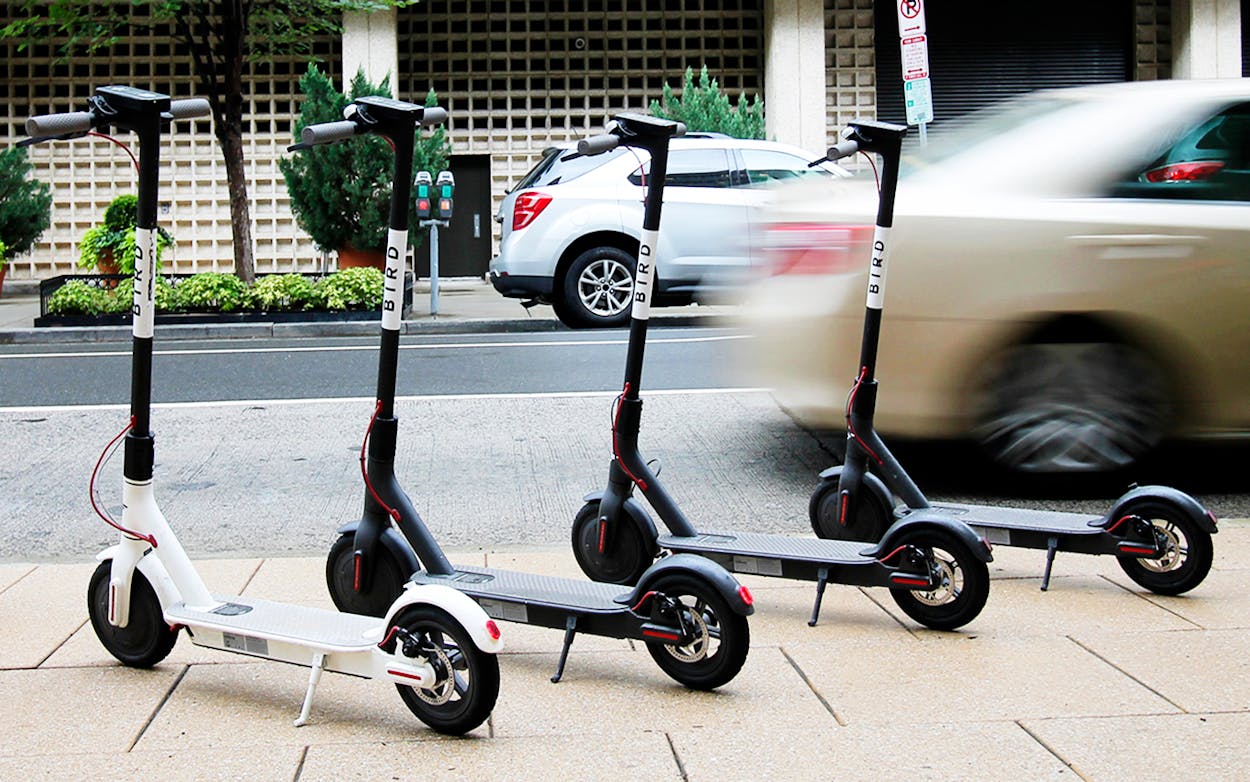On December 5, Bird—the company that has flooded cities across America with its electric scooters—decided to add Frisco to its list of markets. They made their entrance in classic “disruptor” fashion: by plopping 200 scooters on the city’s streets in the middle of the night and letting the city figure out what to do about it.
That approach has been successful in much of the country. The company operates in more than 100 cities, and municipalities often find some way to accommodate their arrival. But Frisco resisted, telling citizens that though they “like to be innovators and scooters may fit into our mobility plan, their execution was not to our standards.” When a representative for the company attended a city council meeting post-launch, members accused them of “burn[ing] an incredible amount of goodwill” and asked why they didn’t consult with local officials ahead of time.
The company didn’t have much of an answer (according to Community Impact, the representative said that they did a “legal analysis” and identified Frisco as a potentially strong market), and Bird was given a deadline of December 17 to remove the scooters. Bird did not, and at 8 a.m. on Monday morning, the city deployed code enforcement officers to remove the scooters.
Bird’s practice of blanketing a city with scooters first, then asking leaders about it later, has yielded mixed results. In April, they deployed the same strategy in Austin, leading the city council to pass emergency rules restricting the devices. A month later, the city voted on regulations that would allow them to operate, and the company—along with scooters from Lime, Uber, Lyft, and other companies—have since become an omnipresent part of transportation. The approach yielded the same result in Denver, and other cities with a reputation for being a safe place for tech “disruptors.” (In San Francisco, which had banned the scooters, regulations were written that allowed for companies to operate in the city in the fall as part of pilot program. Bird and Lime, because of their previous violations, were excluded.)
Electric scooters, no matter the city, have become increasingly controversial. They have their proponents: advocates of solutions to the “last mile” problem (or the idea that difficulties in getting people from public transportation to their homes keeps them dependent on cars) tout the potential of the scooters to reduce traffic, help the environment, and transform cities into more comfortable and livable places, which happens to be how the companies bill themselves. Critics, however, question whether the business model is sustainable, if the products are safe, if littering the streets with scooters is a trade-off we’re willing to make, and if—as the Dallas Morning News put it in an editorial—the way these companies have “bad manners.”
All of those things can be—and almost certainly are—true. Scooters do offer an exciting solution to a very real problem of urban mobility. The dockless nature of them is part of the appeal—the fact that a person can ride one all the way home, and then just leave it behind for the next person when they go inside, is easier than having to track down an approved place to leave one, especially in suburban areas like Frisco. But it’s also a big part of the problem. Bird would have certainly had to have conversations with Frisco officials if they’d needed to build docks before debuting, and it allows customers to litter the streets with unwelcome devices.
And that doesn’t touch upon the safety issue, which the CDC is currently studying based on the results of hospital visits in Austin during the fall. Earlier this month, Atlanta-based blogger George Chidi broke down the ways that the health and safety risks of the scooters lead to questions about the viability of the companies’ business models. Chidi estimates (while recovering from injuries sustained on a scooter) that one out of every 286 rides that occurs in Atlanta ends with a visit to the ER. Assuming an average per-visit cost of $2,000 (which is on the low end), Chidi argues that people pay more for the medical care that’s required to treat injuries sustained on scooters than the companies themselves earn in revenue.
These are the conversations we aren’t yet having about the scooters that have been appearing across the country for the the past year and a half—and it’s one that’s increasingly likely to center on Texas, as the state’s low-regulation culture makes us a more appealing test market than typical tech-hubs like California (whose largest cities have passed a host of rules making it more difficult for the companies to operate). Frisco, in banning the Bird scooters shortly after they deployed, entered into a strong negotiating position that can force that conversation to happen. If Austin, Dallas, and San Antonio—all cities that currently allow the scooters, but have the opportunity to refine their rules—follow Frisco’s lead, we might finally have a sense of what it’ll take for these useful devices to operate like good members of our communities.








